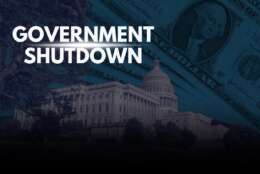
Fed up feds may have good news on shutdown
Guest commentator Jeff Neal explains why his long-time optimism about working for the federal government may be fading if another shutdown happens this month or...
This column was originally published on Jeff Neal’s blog, ChiefHRO.com, and was republished here with permission from the author.
After enduring the longest shutdown in history, federal workers and contractors who have been facing the possibility of yet another shutdown may have some good news. On Monday night news broke that House and Senate conferees have agreed “in principle” for fiscal 2019 funding for the agencies that were affected by the recent partial shutdown.
The report is good news, but we have seen agreements “in principle” blow up on the way to being finalized. You may recall that the House and Senate had an agreement in December that would have avoided the recent shutdown. We know how that worked out. With that in mind, here are a few of the potential outcomes.
A deal
There is a chance the deal will hold. Each side will give up something, they will sign a deal, the president will sign off, and the government will be funded until Sept. 30. For most of our history, that is the way Washington worked. Everyone realized that compromise was the way civilized people operate. Everyone gives a little and declares victory.
Let’s hope that is what happens here. I will believe it when I see a presidential signature.
Punt
If this agreement falls apart or takes too long to reduce to writing, the classic Washington move is to pass another short-term continuing resolution to buy more time. The recent shutdown ended with a short-term CR, which is why we are where we are. The funding for Oct. 1, 2018, through the beginning of the recent shutdown was also a CR.
CRs loosely translate to “we can’t do our jobs, so we will punt.” Outsiders may look at CRs and wonder what is wrong with them — plenty. The biggest problem is uncertainty. Agencies do not know what their budget for the rest of the year will be, so they may limit hiring or contracts. Then they get an appropriation for the rest of the year that has to be obligated before midnight on Sept. 30. Then they are beaten up for spending a lot of money in the last weeks of the fiscal year.
Another big problem is that agencies cannot start new projects during a CR. That means many priorities are deferred. Anyone who knows anything about government will tell you CRs are a miserable way to run a government.
Hitting the debt ceiling
Here is where it gets crazy: There is a chance that the parties will strike a deal, and then we will run into a wall. No, not the president’s wall but rather the debt ceiling. Another peculiar feature of modern politics is that appropriating money is not enough. Beginning with the Second Liberty Bond Act in 1917, we have a debt ceiling that limits the amount of money the government can borrow.
When it comes to spending, where Congress has to appropriate money anyway, the purpose of the debt ceiling is mostly political. But the impacts are real. March 1 is the deadline for the debt ceiling to be raised or suspended. So it is possible that we could see a crisis averted by an appropriations deal, but then turn around and see another just two weeks later. Conferees are attempting to include the debt ceiling increase in a comprehensive deal, but there is still no guarantee.
Related Stories
Another shutdown now or in October
Related Stories
This is the one most federal employees and contractors in the affected agencies are dreading. They are starting to recover from the five week shutdown that just ended. In fact, some are still dealing with back pay issues and many contractors are not getting back pay at all. The logical take on another shutdown is that it would only last a few days and then the politicians would come to their senses.
I used to think that way. But look at what has happened. The Budget Control Act of 2011 — the resolution of the 2011 debt ceiling crisis — introduced us to sequestration. You may recall that sequestration was supposed to be the legislative equivalent of a gun to the head. The outcomes would be so bad that members of Congress would get their act together and pass appropriations bills.
And we know how that worked out. Many people including me thought the last shutdown would be brief because the Republicans would want it to end while they still controlled the House of Representatives. And we know how that worked out.
The bottom line is that traditional expectations of things happening in Washington are no longer valid. Would another shutdown be viewed by most people as a total failure of the political process? Yes. Would anyone really win? No. Will it happen? Maybe.
Even if we see an agreement to avert a shutdown now, appropriators will have to start working on funding for fiscal 2020, which begins on Oct. 1. Maybe the parties will not want to go into an election year with another failure on their hands? Maybe they will think they should play hardball to appeal to their base voters? Who knows?
After working in and around federal human resources for 40 years, I am growing more worried about the impact of shutdowns. The effect on workers is obvious, and another protracted shutdown could be financially ruinous for some people. The longer term effect of the recent shutdown and the continuing uncertainty is that agencies will be more likely to see increased turnover and they will have far more difficulty hiring new people to replace them.
Latest Government Shutdown News
So, if we start seeing high performers in the most in-demand jobs leaving, how likely is it that agencies will be able to replace them? Let’s see — the hiring process is broken, the government looks like a far more risky place to work than in the past. And there is little likelihood the political situation is going to change soon. The math on that one is simple.
If agencies cannot hire the talent they need, some would argue that they can just outsource the work. The problem is that contractors got hit in the last shutdown, too. One question that applicants are likely to ask is, “Did any of your employees lose pay in the government shutdown?” If the answer is yes, those companies may find it is much harder to get top talent to say “yes.” So “just outsource it” is not a good response.
Longtime readers know I am usually more optimistic than this post sounds. I have to admit I cannot blame people who say they would not go to work for the government. In fact, if we see another shutdown this week or in October, or another debt ceiling crisis, or both, my long-standing recommendation that young people seriously consider government as a career may finally change.
Am I fed up? Yes, are you?
Jeff Neal is a senior vice president for ICF and founder of the blog, ChiefHRO.com. Before coming to ICF, Neal was the chief human capital officer at the Homeland Security Department and the chief human resources officer at the Defense Logistics Agency.
Copyright © 2024 Federal News Network. All rights reserved. This website is not intended for users located within the European Economic Area.






